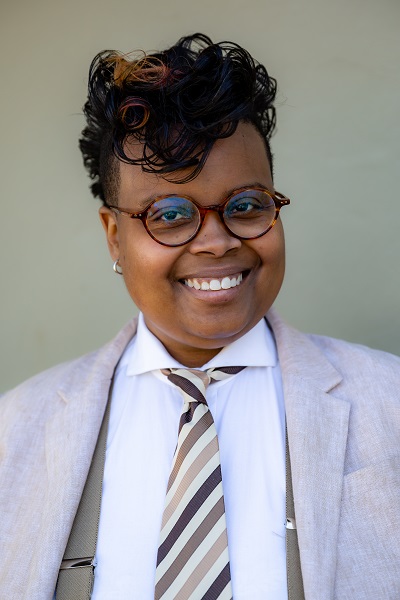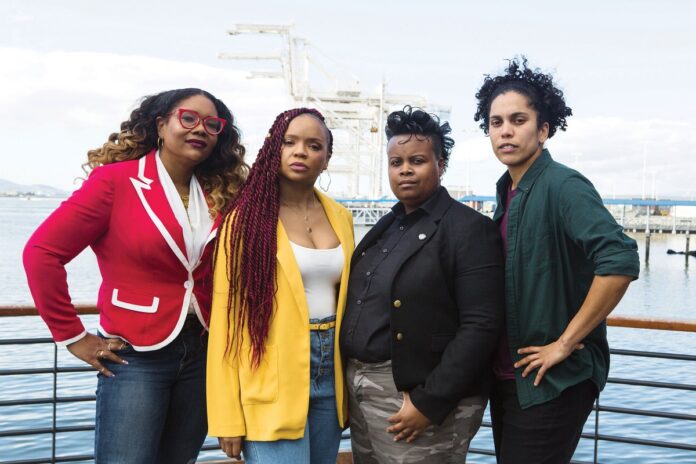Amber E. Senter is incubating and has been for some months now. Around Christmas, she expects to distribute the first run of delicious, small-batch cannabis edibles produced by fledgling brands owned and operated by Black, Indigenous, and people of color (BIPOC) entrepreneurs.
“I’ll be helping them come up with products, develop their formulations, assess the packaging, and also assessing the data,” Senter explained. “You know, we’ve partnered with a data company just so we can make sure the products we’re developing make sense for the market.”
Senter loves cannabis and is well known for spreading that love. As chief executive officer at Breeze Distro, co-founder of advocacy group Supernova Women (which recently celebrated its fifth anniversary), founder of The Congo Club brand, and a Black woman, she is well-versed in the obstacles entrepreneurs of color must overcome to stake a claim in the industry. So, when the City of Oakland, California, decided to fund a social equity business incubator focused on cannabis edibles, Senter had the skills to head up the project. The result: EquityWorks! Incubator, the first state-funded cannabis business incubator in the United States. Oakland officials committed $250,000 to fund five social equity fellows through the program. The fellows were chosen in October from a field of nearly a dozen applicants.

Another $200,000 from California’s cannabis social equity program enabled Senter and her facility partner Cesar Angobaldo to build out the industrial kitchen and production space located in Oakland. EquityWorks! is housed in a 1,200-square-foot shared facility for cannabis product manufacturing and cultivation.
“Supernova Women also worked with the City of Oakland to develop the social equity program as it is today and, over the years, we’ve been really heavily advocating for shared spaces,” Senter said. “Because we saw the barriers of entry to manufacturing and cultivation, we felt like we really needed shared spaces. And we always thought it would be awesome if cities allocated funds to a shared manufacturing facility like what we have today [at EquityWorks!]. So, I definitely appreciate the advocacy work we’ve done over the years, because it’s allowed this opportunity. And I feel blessed to be the one to do this. It’s awesome.”
The incubator offers aspiring manufacturers reduced overhead costs, mentorship, networking, workshops covering all aspects of edibles manufacturing, and distribution through Breeze Distro. EquityWorks! requires fellows to be at or below 80 percent of the local median income, have lived in a high-crime zone for ten of the past twenty years, or previously have been convicted of a cannabis-related crime.
Why does the incubator focus on edibles? According to Senter, BIPOC own only 3 percent of California’s cannabis businesses, and very few of those businesses are in the manufacturing sector due to high regulatory and infrastructure costs. Yet edibles sales are rising steadily, with 20-percent year-over-year growth. She said Black people always have created recipes and developed ways to use cannabis in edibles but lacked the resources and know-how to bring products to market.
“We’ve partnered with a data company just so we can make sure the products we’re developing make sense for the market.”
“I’ve been working on some strategic retail partnerships for the past several months so, once they’ve got their products ready, they’ll be in the biggest, highest-volume dispensaries throughout the state of California,” said Senter. “It’s really exciting. This is such a great opportunity for the manufacturers to know they won’t have to have this struggle of trying to get on the shelves.
“That is really the problem with brands [owned by BIPOC],” she explained. “It’s really hard for us to get on the shelves because we don’t know anyone, and we don’t have any connections. When you’ve got all of these Black and Brown cannabis businesses in the supply chain that aren’t necessarily being seen, then people start to wonder where the Black and Brown brands are. ‘Oh, well, they’re distributors. Oh, they’re a delivery service.’ But they’re not actual products that people are buying because they don’t have the money to go in the infrastructure, to set up something like this [incubator], you know?
“X company gets bought out or merged or whatever, and then some big company like Coca-Cola wants to come into cannabis and buy up a bunch of brands,” Senter continued. “They’re buying brands that are seen on the shelves. They’re buying [those brands’] customer loyalty. And how can we build [customer loyalty] if we don’t have [shelf space]? If we don’t have enough money to set up a real brand or product that’s in the customers’ faces? So, we’ve made this case to the City of Oakland. They totally agreed and see exactly where we’re coming from, and that’s why they decided to do [EquityWorks! Incubator].”
Because cannabis is still a somewhat controversial topic in Black communities—where the wages of the war on drugs often have been paid with generational incarceration—some people still find staying on the illicit side of the market more attractive than entering the legitimate industry.
Senter wants to show the BIPOC community, including those who have been affected by incarceration, women, and other marginalized individuals, the opportunities available in legal cannabis. It’s a once-in-a-lifetime chance to become part of a new industry that has the potential to generate billions in revenue for brands for decades to come, she said—the kind of wealth that could become dynastic and allow people previously without means to participate and prosper in the new economy of the future post-pandemic world.
In fact, Senter was able to achieve her dream of advocacy and entrepreneurship after moving to Oakland from Chicago in 2013. Bay Area veteran medical cannabis activist Mickey Martin, who had befriended Senter on Facebook, offered her a job. Since then, Oakland has become a hub for progressive cannabis policy, Senter said, and a home for industry members and consumers from all walks of life.
“I moved out here, and I feel like I’m able to be very dynamic,” Senter said. “I’m able to use all of my skills. Prior to me being in [commercial] design, I was in the United States Coast Guard on an officer track. I ended up not becoming an officer because I got hurt. But, you know, I have a lot of leadership skills and leadership training from that experience. I’ve got this branding background. And now I feel like I’m able to utilize so many different skills that I have just being an entrepreneur.
“I’m an organized kind of organizational person, and I’m able to have my own personality, which I love,” she continued. “Anybody who knows me knows how much I love smoking weed. I love the plant so much, and I’ve been able to live my fullest [through my association with cannabis].”
Senter, who suffers from the autoimmune disorder lupus, added, “Everything that I love, I’m able to do every day and, yeah, moving here and being in the industry completely changed my life. I’m also able to take care of myself and deal with lupus issues with cannabis and without being afraid. I’m not going to lose my job because of the way I choose to heal myself.
“So, yeah, it’s been a really awesome, awesome journey.”











